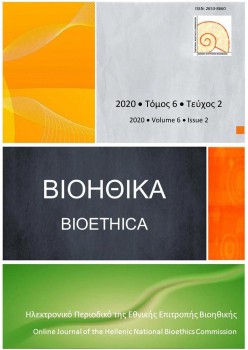CRISPR, an innovation in the field of gene editing. Proposing a way to include it in a public health system

Abstract
The invention of CRISPR technology and its current and potential applications have been a subject of controversy among scientists, philosophers and legal theorists. After taking under consideration the current discussion concerning the use of CRISPR for editing human genome the article treats the question of a wider offer of CRISPR-based therapies from a Public Healthcare system and proposes method for a fair and financially sustainable way for adopting the new possibilities this new tool has to offer.
Article Details
- How to Cite
-
Kolisis (Νικόλαος Κολίσης) N. (2020). CRISPR, an innovation in the field of gene editing. Proposing a way to include it in a public health system. Bioethica, 6(2), 30–40. https://doi.org/10.12681/bioeth.24843
- Section
- Original Articles

This work is licensed under a Creative Commons Attribution 4.0 International License.
Authors who publish with this journal agree to the following terms:
- Authors retain copyright and grant the journal right of first publication with the work simultaneously licensed under a Creative Commons Attribution CC BY 4.0 License, which allows for immediate free access to the work and permits any user to read, download, copy, distribute, print, search, or link to the full texts of articles, crawl them for indexing, pass them as data to software, or use them for any other lawful purpose. Appropriate credit must be given by citing the author(s) and the original publication in this journal.
- Authors are able to enter into separate, additional contractual arrangements for the non-exclusive distribution of the journal's published version of the work (e.g. post it to an institutional repository or publish it in a book), with an acknowledgement of its initial publication in this journal.
We encourage authors to deposit their articles, as well as data underlying the publications, in institutional and/or other appropriate subject repositories.
Bioethica permits and encourages authors to archive the final publication pdf in institutional (e.g. the repository of the National Hellenic Research Foundation) or other appropriate subject repositories (e.g. SSOAR repository for social sciences), in compliance with institutional and/or funder open access policies, after publication in the BIOETHICA. Authors must provide bibliographic details that credit publication in the journal, as well as related funding details (when applicable).
Lists of institutional and other subject-based academic open access repositories can be found listed by country at the registry http://opendoar.org/countrylist.php
If your institution does not possess a repository you may deposit a copy of your paper at no cost with www.zenodo.org , the repository supported for open access research in the EU by the European Commission, through the project OpenAIRE (www.openaire.eu )


